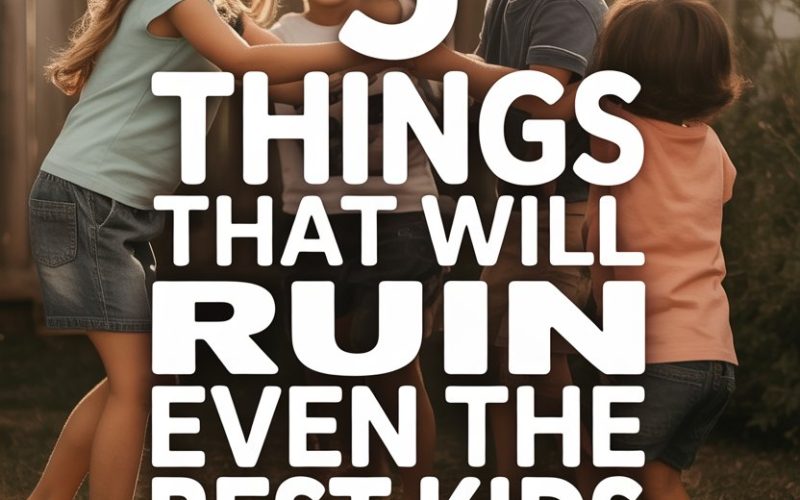Every parent—yes, even the ones who post those excruciatingly perfect Instagram family photos—worries they’ll mess up at least a little.
The thing is, raising great kids isn’t about never slipping up; it’s about dodging those surprisingly common pitfalls that can spoil even the sweetest apple in the orchard.
Here are five biggies to watch for if you’re hoping to keep your cherubs from morphing into tiny supervillains.
1. Constant Praise Without Substance
Your child draws a potato-shaped blob, and suddenly you’re declaring it the next Picasso. “You’re so talented! You’re the best artist ever!” Sound familiar?
While encouragement is as crucial as coffee on a Monday morning, empty praise can do more harm than good.
Kids are clever. If everything they do is amazing, nothing really is. Over time, they may stop striving for genuine improvement and instead crave the dopamine rush of your applause.
The science backs this up: experts warn that piles of unspecific praise can actually reduce motivation and create fragile egos.
Try this: swap “You’re so smart!” for “That was a tough puzzle, but you stuck with it. Well done for not giving up!”
It’s effort and resilience that deserve a standing ovation, not just innate ability or generic results.
The next time you’re tempted to shower your child with grandiose praise, ask yourself: Did they actually do something remarkable, or am I just on auto-parent?
Kids can spot phoney flattery faster than you can say “screen time”.
2. Never Letting Them Fail
If you’ve ever hovered near your child on the climbing frame, ready to catch them before they even wobble, congratulations: you may be an official member of the “lawnmower parent” club.
Clearing every obstacle from your child’s path seems loving (and it does wonders for your step count), but it can backfire spectacularly.
A bit of falling—sometimes literal, sometimes metaphorical—is how kids learn grit. When we shield them from all discomfort or frustration, we rob them of resilience.
According to Stanford research, children who are allowed to struggle, regroup, and try again are far more likely to grow into confident, capable adults.
If you’re wincing at the memory of your child’s most recent meltdown over a toppled LEGO tower, good. That means you care. Just try not to swoop in with solutions or rescue missions at every sign of distress.
Sometimes the best thing you can do is hand them a metaphorical dustpan and encourage them to clean up the mess—then watch as they surprise you.
3. Setting Unrealistic Expectations
Ever catch yourself saying, “Why can’t you be more like your sister?” or “You should know better than that by now!”? Welcome to the club—membership is involuntary, and the guilt is free.
Piling on expectations that are out of reach sets kids up for one of two things: relentless anxiety or mutinous rebellion (sometimes both, if you’re lucky).
Expecting perfection in school, sport, music, or anything else can leave your child convinced they’re only as good as their latest achievement.
Decades of child development research show that while having standards matters, pushing unrealistic ones can be toxic. It teaches children that their worth is tied to performance, not who they are.
Instead, get curious about your child’s strengths. Not everyone’s destined to be a spelling bee champion or a maths whiz. Some shine brightest when allowed to follow their own quirky path.
Keep your standards, but balance them with acceptance and flexibility. If your child brings home a C in algebra but spent hours trying, maybe that deserves a celebratory hot chocolate.
4. Over-Scheduling Every Waking Minute
Remember when childhood meant lazy afternoons, muddy puddles, and occasionally being bored out of your mind?
These days, many kids’ lives are as tightly packed as the London Tube at rush hour. Between football, French horn, coding club, and Kumon, who has time to just… be a kid?
Overscheduling isn’t just exhausting for you (and for your wallet). Studies like this one suggest that too many structured activities can zap creativity, heighten stress, and make family life feel like an endless relay race.
Boredom is not the enemy. It’s actually the birthplace of imagination—and sometimes, mischief, but that’s character-building, too. Let the odd hour hang loose.
Your child might invent a game, build a den, or realise how much fun it is to annoy their siblings (sorry).
If you find yourself acting as your child’s unpaid Uber driver seven nights a week, it might be time to trim the schedule. The world won’t end if they skip one club.
Unstructured time is where friendships are forged, independence blooms, and everyone gets a breather.
5. Modelling Bad Behaviour (Even in Tiny Doses)
Children are expert copycats. They’ll ignore your lectures but memorise your every sigh, eye roll, and passive-aggressive mutter.
If you’re constantly glued to your phone, snap at your partner, or have the patience of a caffeinated squirrel in traffic, your child is soaking it all up.
Turns out, the old “Do as I say, not as I do” routine works about as well as a chocolate teapot.
Research from Harvard shows that kids learn empathy, kindness, and self-control by watching us—not just listening to instructions.
Nobody’s perfect. If you lose it and morph into a shouty banshee, own it. Apologise. Model humility and a willingness to improve.
You can’t expect your little ones to have the patience of a saint if you’re stomping around like an irate hippo after a bad day.
Think of yourself as the world’s least-paid, most-observed role model. If you want your child to be polite, patient, and resilient, aim for those qualities yourself—even if you sometimes have to fake it.
Small Shifts, Big Results
Raising children is a series of spectacularly imperfect experiments. Even the best kids will make mistakes, throw tantrums, and occasionally try to flush something unspeakable down the loo.
Perfection is a myth, but awareness is golden.
By skipping empty praise, letting kids flounder and recover, setting kind expectations, pruning the planner, and showing up as your best (flawed) self, you’re setting the stage for your children to thrive—quirks and all.
Tonight, exhale. Give yourself permission to be “good enough.”
Maybe praise your child for their effort in brushing their teeth (despite the toothpaste Picasso on the sink), resist the urge to fix their every wobble, and—if you slip up—laugh about it together.
Chances are, you’re doing better than you think.





